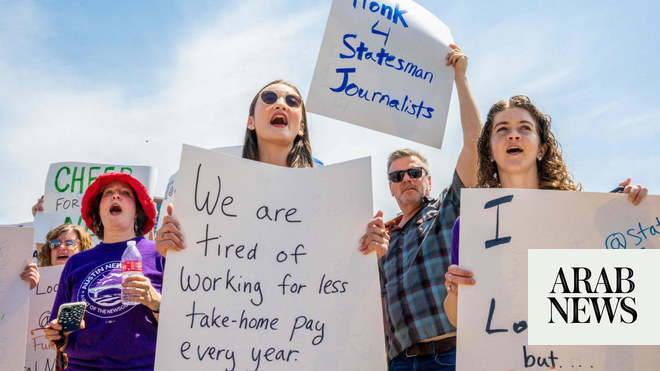
With the words “No one is remotely indispensable,” British Prime Minister Boris Johnson last week announced he was ending his three years in the post after being subjected to tremendous pressure by his party. More than 50 Cabinet members and officials stepped down in the space of 48 hours. They protested his leadership and missteps and urged him to resign and open the door for a new government.
He is stepping down at a critical time, with the Western world confronting the Russian aggression in Ukraine and its economic consequences, which have led to inflation, high fuel prices and the cost of all life necessities soaring in a vast majority of countries.
Johnson’s departure leaves the Ukrainian people, several European governments and the US anxious about what happens next regarding the firm British stance against Moscow. However, the next leader of the Conservative Party will surely follow in Johnson’s footsteps and be an influential figure on the Ukrainian crisis. They will most likely pursue the same robust, solid policies regarding Russia and Ukraine.
In his resignation remarks, Johnson highlighted his country’s support of the Ukrainian people, saying: “I am immensely proud of the achievements of this government, from getting Brexit done to settling our relations with the continent for over half a century… and, in the last few months, leading the West in standing up to Putin’s aggression in Ukraine.” He added that the UK would back the Ukrainian people in their fight for freedom for as long as it takes.
But how will the recent dramatic events in London affect US-UK bilateral relations?
On Thursday, US President Joe Biden stressed that the “special relationship” between the two countries would remain strong and enduring, as London is one of Washington’s main allies and partners. Even though Biden did not mention Johnson by name, he reiterated his commitment to continue working with the British government on critical issues, such as the war in Ukraine.
The next Conservative leader will most likely pursue the same robust, solid policies regarding Russia and Ukraine.
Dalia Al-Aqidi
“I look forward to continuing our close cooperation with the government of the United Kingdom, as well as our allies and partners around the world, on a range of important priorities. That includes maintaining a strong and united approach to supporting the people of Ukraine as they defend themselves against Putin"s brutal war on their democracy and holding Russia accountable for its actions,” Biden said in a statement.
According to Karine Jean-Pierre, the White House press secretary, Washington believes that Johnson’s resignation will not impact the president’s efforts to unite Europe. Addressing the American media, she pointed to Biden’s recent meeting with NATO leaders in Spain, in which there was agreement that Moscow poses the most significant threat to the security of his country’s closest allies. “What you"re seeing currently today, because of the leadership of this president, is a more unified NATO. I don’t think that changes at all,” Jean-Pierre added.
The fact that the new government will come from within the British Conservative Party — which is more pro-America than its main opposition, the Labour Party — means concerns will not be raised in Washington for the time being. The relations between the two countries are vital for both the White House and 10 Downing Street.
Several Democratic lawmakers considered Johnson’s stepping down and the loss of his party’s confidence as a clear message to former President Donald Trump, who was very close to Johnson, that his time is over in case he tries to enter the US presidential race in 2024.
Tennessee Democratic Rep. Steve Cohen posted on his official Twitter account that Johnson would inevitably face reality and resign, noting that politics is a science and the science says his time has come. Cohen suggested that maybe the British leader should take a rest and relaxation break at the Mar-A-Lago resort, Trump’s current residence in Florida.
The US-UK relationship will remain as it is now, given the need for both to continue mobilizing the support of EU and NATO countries for Ukraine at a time when the world is going through a severe economic crisis.
• Dalia Al-Aqidi is a senior fellow at the Center for Security Policy.
Twitter: @DaliaAlAqidi












